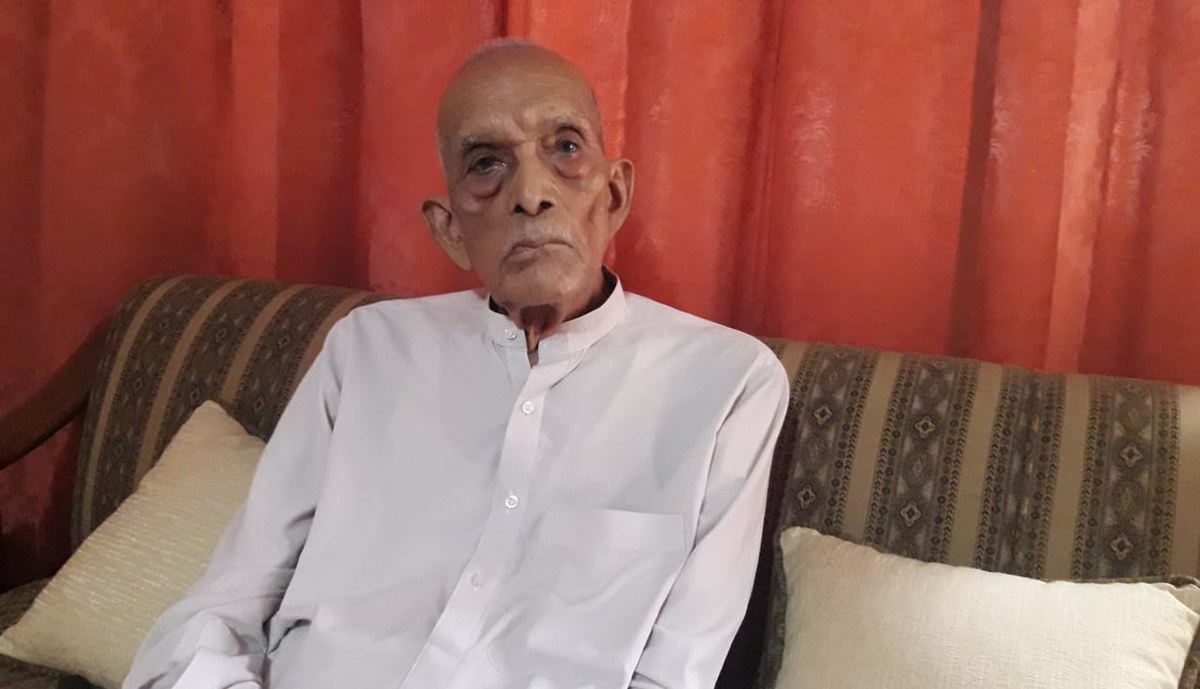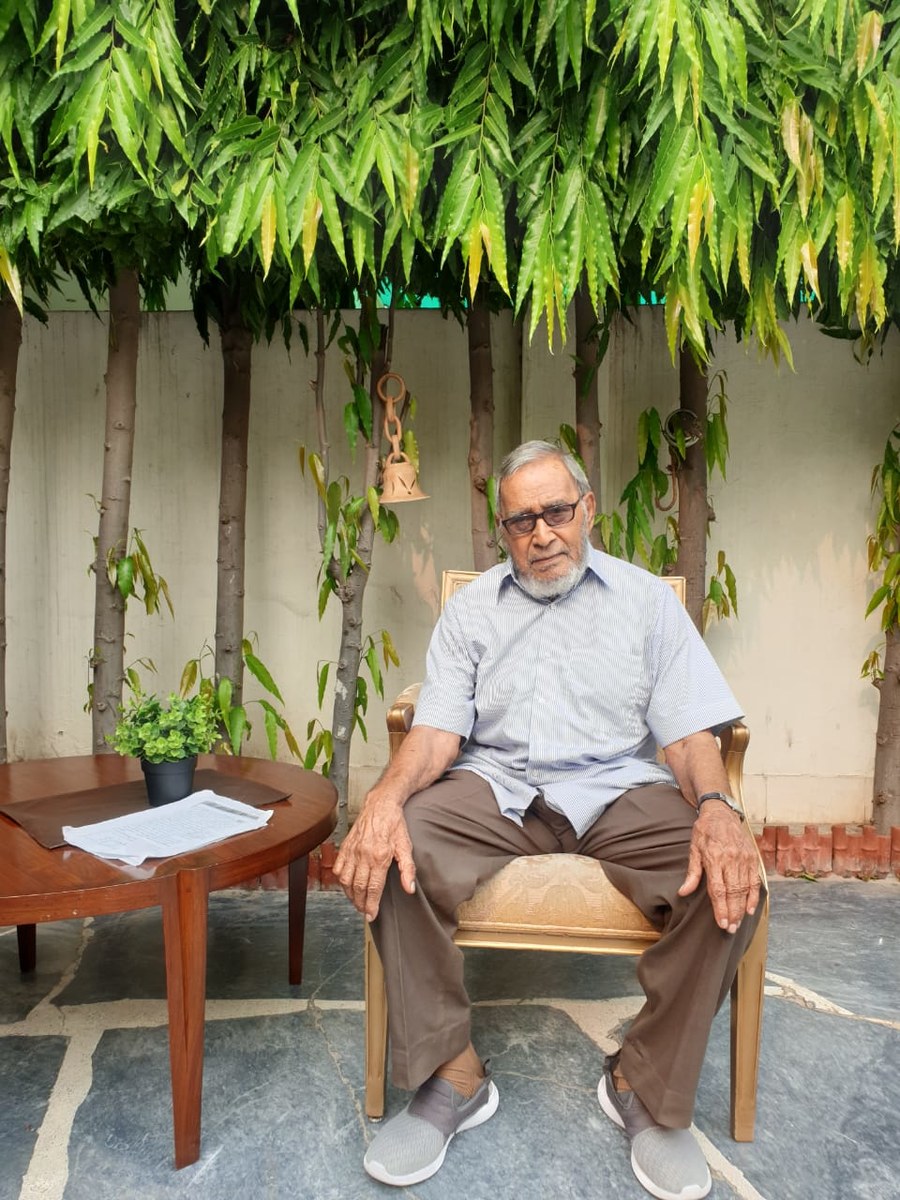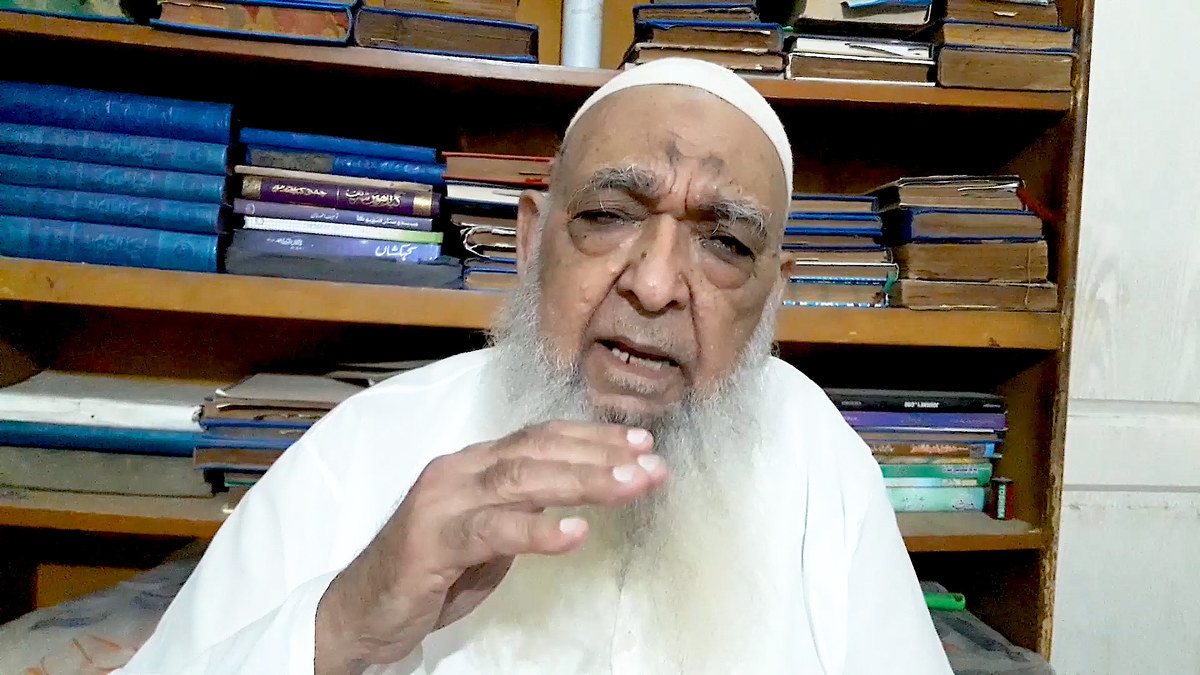KARACHI: Muhammad Shamsul Haq, who celebrated his 100th birthday in March this year, has witnessed several bittersweet moments of history but one memory stands out above all: the partition of India in 1947, when Muslim Pakistan came into being at the end of British rule.
A mass migration followed, marred by violence and bloodshed as about 15 million Muslims, Hindus and Sikhs, fearing discrimination, swapped countries in a political upheaval that cost more than a million lives.
During the chaotic transition, train cars full of bodies arrived at railway stations in the twin cities of Lahore and Amritsar in the province of Punjab, split roughly down the middle at partition on August 14, 1947.
Many survivors of the bloodshed found themselves separated from family on the other side of a hastily drawn-up border.

An eye witness of the creation of Pakistan Shams-ul-Haq poses for a picture while sharing the details of Pakistan movement to Arab News. (AN Photo)
Haq, who was born in 1920 in Ballia district of Uttar Pradesh in India, said he had started work as a government servant in Delhi in 1940 when the movement for a free homeland for the Muslims of India began.
“The Pakistan movement was gradually picking up pace, though there was no sign of violence until August 15, 1947,” Haq told Arab News this week.
Before the formal announcement on the partition of the Indian subcontinent, Muslim employees of the Indian government were given the option to stay or leave for Pakistan.
“I came to Karachi on August 5, 1947 with other employees before violence erupted and bloodshed began,” Haq said. “Some of my family members were left behind and suffered a terrible ordeal.”
Haq, who later wrote a memoir, noted with sadness that “the partition was not just the division of land or the creation of new borders but a rupture from the past and separation from a rich cultural heritage and one’s closest friends and relatives.”

An eye witness of the creation of Pakistan Moib Ali Khan poses for a picture while sharing the details of Pakistan movement to Arab News. (AN Photo)
Moib Ali Khan, 94, who said he took part in the movement to create Pakistan, remembered the violence, when bodies were strewn on the streets of Delhi, and said Pakistanis today must fight to protect their hard-earned freedoms.
#Watch: Moib Ali Khan recalls his brief meeting with Muhammad Ali Jinnah, the founder of #Pakistan that motivated him to join the independence movement || #14AugustAzadiDay #IndependenceDay
-
Read more in this special feature by @Khurshid72: https://t.co/svw4GZMpGT pic.twitter.com/USaBhntdwX— Arab News Pakistan (@arabnewspk) August 14, 2020
“The new generation must protect the freedom,” he said. “If something goes wrong, people living here will face the kind of humiliation that is currently suffered by millions of Muslims in India.”
Born in 1926 in Rampur, Khan was part of the Muslim National Guard, a quasi-military group associated with the All India Muslim League, whose advocacy for the establishment of a separate Muslim-majority nation-state successfully led to Partition.
Khan also remembered his meeting with Pakistan’s founder, Muhammad Ali Jinnah.
“One day Fatima Jinnah [Jinnah’s sister] came to our shop and asked us to repair some furniture.” he said. “She gave us her address and we reached her residence in the morning. We were bargaining with each other when the Quaid-e-Azam [Muhammad Ali Jinnah], who was observing the situation from his meeting room, walked up to us and gracefully settled the dispute.”
It was this brief encounter, Khan said, that led him to join the Muslim League and become part of the independence movement.

An eye witness of the creation of Pakistan Muhammad Ghazanfar Khan sharing the details of Pakistan movement to Arab News. (AN Photo)
Muhammad Ghazanfar Khan, 85, said he was inspired by his teachers to dream of a separate homeland for Muslims.
“I was very young but I still remember how diligently our teachers worked to create awareness about the Pakistan Movement among us,” he said. “Our passion for freedom was gaining strength despite the opposition of the landowning class that enjoyed the support of the British rulers.”
Asked how he looked at present day Pakistan, he said that the “promised Islamic country is yet to be established even after all these years.”
“People have forgotten the objective behind the creation of Pakistan,” Khan said. “The same landowners and capitalists that he [Jinnah] fought have tightened their grip on power in this country.”
















